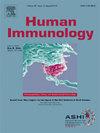Exhaustion profile on classical monocytes after LPS stimulation on Crohn’s disease patients
IF 3.1
4区 医学
Q3 IMMUNOLOGY
引用次数: 0
Abstract
Crohn’s disease is a type of inflammatory bowel disease that leads to symptoms such as diarrhea, abdominal pain, weight loss, and increased risk of developing tumors. The immune system plays a vital role in the gastrointestinal tract by maintaining tolerance to commensal antigens and food. However, in Crohn’s disease, this tolerance mechanism is disrupted, resulting in chronic inflammatory responses. The involvement of the immune system is central to Crohn’s disease, with a wide range of immune cells including monocytes, being affected. Due to the limited understanding of the role of monocytes in Crohn’s disease, our study aimed to clarify the cytokine production and activation profile of monocytes subsets in the context of this condition.
We used multiparametric flow cytometry to analyze the status of monocyte, quantified gene expression using qPCR, and created a correlation matrix to connect the flow cytometry data with the qPCR results through a bioinformatics approach. Our findings indicate that patients with Crohn’s disease show a reduction in all monocyte subsets. Additionally, classical monocytes exhibit an exhaustion profile characterized by increased CD38 expression and reduced IL-1β production following LPS stimulation in patient groups. These results suggest that monocyte subsets play distinct roles in the disease’s pathophysiology of Crohn’s disease, potentially contributing to chronic inflammation and impairing the resolution of the immune response.
求助全文
约1分钟内获得全文
求助全文
来源期刊

Human Immunology
医学-免疫学
CiteScore
5.40
自引率
7.40%
发文量
107
审稿时长
12 days
期刊介绍:
The journal''s scope includes understanding the genetic and functional mechanisms that distinguish human individuals in their immune responses to allografts, pregnancy, infections or vaccines as well as the immune responses that lead to autoimmunity, allergy or drug hypersensitivity. It also includes examining the distribution of the genes controlling these responses in populations.
Research areas include:
Studies of the genetics, genomics, polymorphism, evolution, and population distribution of immune-related genes
Studies of the expression, structure and function of the products of immune-related genes
Immunogenetics of susceptibility to infectious and autoimmune disease, and allergy
The role of the immune-related genes in hematopoietic stem cell, solid organ, and vascularized composite allograft transplant
Histocompatibility studies including alloantibodies, epitope definition, and T cell alloreactivity
Studies of immunologic tolerance and pregnancy
T cell, B cell, NK and regulatory cell functions, particularly related to subjects within the journal''s scope
Pharmacogenomics and vaccine development in the context of immune-related genes
Human Immunology considers immune-related genes to include those encoding classical and non-classical HLA, KIR, MIC, minor histocompatibility antigens (mHAg), immunoglobulins, TCR, BCR, proteins involved in antigen processing and presentation, complement, Fc receptors, chemokines and cytokines. Other immune-related genes may be considered.
Human Immunology is also interested in bioinformatics of immune-related genes and organizational topics impacting laboratory processes, organ allocation, clinical strategies, and registries related to autoimmunity and transplantation.
 求助内容:
求助内容: 应助结果提醒方式:
应助结果提醒方式:


